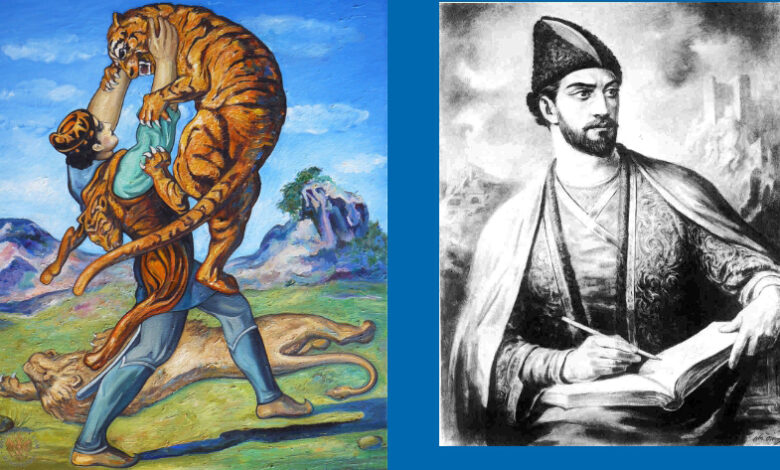
1 Introduction
2 Story of Rostevan, King of the Arabians
3 King Rostevan and Avt’handil Go Hunting
4 How the King of the Arabians Saw the Knight Clad in the Tiger Skin
5 T’hinat’hin Sends Avt’handil to Find the Knight
6 Avt’handil’s Letter to His Vassals
7 Avt’handil Sets Forth in Quest of the Knight
8 Avt’handil’s Tale as Told to Asmat’h in the Cave
9 The Meeting of Tariel and Avt’handil
10 The Telling of His Tale by Tariel When He First Told It to Avt’handil
11 Tariel Tells the Tale of His Falling in Love When He First Fell in Love
12 First Letter Written by Nestan-Daredjan to Her Lover
13 First Letter Written by Tariel to His Beloved
14 Tariel Writes a Letter and Sends a Man to the Khatavians
15 Nestan Summons Tariel to Her
16 The Letter Written by the King of the Khatavians in Answer to Tariel
17 The Meeting of Tariel and Nestan
18 Tariel’s Departure for Khataet’hi and Great Battles
19 Letter of Tariel to the King of the Indians When He Triumphed Over the Khatavians
20 Letter of Nestan-Daredjan Written to Her Beloved
21 Tariel’s Weeping and Fainting
22 Tariel’s Letter in Answer to His Beloved
23 Counsel About Nestan-Daredjan’s Marriage
24 Counsel Between Tariel and Nestan-Daredjan and Its Results
25 The Coming to India of Khvarazmsha’s Son and His Slaying by Tariel
26 Tariel Hears Tidings of the Loss of Nestan-Daredjan
27 The Story of Nuradin-P’hridon When Tariel Met Himon the Seashore
28 Tariel’s Aid to P’hridon, and Their Victory OverTheir Foes
29 P’hridon Tells Tariel Tidings of Nestan-Daredjan
30 The Story of Avt’handiPs Return to Arabia After He Had Found and Parted From Tariel
31 Avt’handiPs Request to King Rostevan, and the Vizier
32 Avt’handiPs Discourse With Shermadin When He Stole Away
33 The Testament of Avt’handil to King Rostevan When He Stole Away
34 Avt’handils Prayer and His Flight
35 King Rostevan Hears of Avt’handils Secret Flight
36 Avt’handils Second Departure and Meeting with Tariel
37 Avt’handil Comes Upon the Unconscious Tariel
38 Tariel Tells of the Killing of the Lion and the Tiger
39 Here Is the Going of Tariel and Avt’handil tothe Cave and Their Seeing of Asmat’h
40 Of the Going of Avt’handil to P’hridon’s When He Met Him at Mulghazanzar
41 Of Avt’handils Going to P’hridon’s When He Parted From Tariel
42 Avt’handils Departure From P’hridon to Seek Nestan-Daredjan
43 The Story of Avt’handils Arrival in Gulansharo
44 Avt’handils Arrival at P’hatman’s; Her Reception of Him and Her Joy
45 P’hatman Becomes Enamoured of Avt’handil; Writes Him a Letter and Sends It
46 The Letter of Love Written by P’hatman to Avt’handil
47 Avt’handil’s Letter in Answer to P’hatman’s
48 Here Is the Slaying of the Chachnagir and His Two Guards by Avt’handil
49 P’hatman Tells Avt’handil the Story of Nestan-Daredjan
50 The Story of the Capture of Nestan-Daredj an by the Kadjis, Told by P’hatman to Avt’handil
51 The Letter Written by P’hatman to Nestan-Daredjan
52 The Letter Written by Nestan-Daredjan to P’hatman
53 The Letter Written by Nestan-Daredjan to Her Beloved
54 Avt’handil’s Letter to P’hridon
55 Avt’handil’s Departure from Gulansharo and His Meeting With Tariel
56 Tariel and Avt’handil Go to P’hridon
57 The Counsel of Nuradin-P’hridon
58 The Counsel of Avt’handil
59 The Counsel of Tariel
60 The Taking of the Castle of Kadjet’hi and the Saving of Nestan-Daredjan
61 The Going of Tariel to the King of the Seas
62 The Wedding of Tariel and Nestan by P’hridon
63 Tariel Goes Again to the Cave and Sees the Treasure
64 Here Is the Marriage of Avt’handil andT’hinat’hin by the King of the Arabs
65 Tariel Hears About the Death of the King of India
66 The Arrival of Tariel in India and His Conquest of the Khatavians
67 The Wedding of Tariel and Nestan-Daredjan
68 Epilogue
Introduction
1
HE who created the firmament, by that mighty power
made beings inspired from on high with souls celestial;
to us men He has given the world, infinite in variety we
possess it; from Him is every monarch in His likeness.
2
O ONE God! Thou didst create the face of every form!
Shield me, give me mastery to trample on Satan, give me
the longing of lovers lasting even unto death, lightening
the sins I must bear thither with me.
3
OF that lion whom the use of lance, shield and sword
adorns, of the queen, the sun T’hamar, the ruby-cheeked,
the jet-haired, of her I know not how I shall dare to sing
the manifold praise; they who look upon her cannot but
taste choice sweets.
4
BY shedding tears of blood we praise Queen T’hamar,
whose praises I, not ill-chosen, have told forth. For ink
I have used a lake of jet and for pen a pliant crystal.
Whoever hears, a jagged spear will pierce his heart!
5
SHE bade me indite sweet verses in her praise, laud her
eyebrows and lashes, her hair, her lips and teeth, cut
crystal and ruby of Badakhshan arrayed in ranks. An anvil
of soft lead breaks even hard stone.
6
NOW want I tongue, heart and skill for utterance! Grant
me strength! And if I have aid from thee I shall have
understanding, so may we succour Tariel; tenderly indeed
should we cherish his memory and that of the three star-like
heroes wont to serve one another.
7
COME, let us sit and shed a never-drying tear for Tariel’s
sake. In truth none like him has ever been. I sat me down,
I, Rust’hveli, indited a poem, my heart pierced with a
lance. Hitherto the tale has been told as a tale; now is it a
pearl of measured poesy.
8
I, RUSTHVELI, have composed this work by the folly of
my art. For her whom a multitude of hosts obey, I lose my
wits, I die! I am sick of love, and for me there is no cure
from anywhere, unless she give me healing or the earth a
grave.
9
THIS Persian tale, now done into Georgian, has hitherto
been like a pearl of great price cast in play from hand to
hand; now I have found it and mounted it in a setting of
verse; I have done a praiseworthy deed. The ravisher of my
reason, proud and beautiful, willed me to do it.
10
EYES that have lost their light through her long to look
on her anew; lo! my heart is mad with love, and it is my lot
to run about the fields. Who will pray for me ? The burning
of the body sufficeth, let the soul have comfort! The verse
in praise of the three like heroes cannot but affect the hearer.
11
WITH what Fate gives to a man, therewithal should he be
content, and so speak of it. The labourer should ever work,
the warrior be brave. So, also, should the lover love Love,
and recognise it. Neither must he disdain the love of
another, or that other disdain his.
12
MINSTRELSY is, first of all, a branch of wisdom; the
divine must be hearkened to divinely, and wholesome is
to them that hearken; it is pleasant, too, if the listener be
a worthy man; in few words he utters a long discourse:
herein lies the excellence of poetry.
13
LIKE a horse is tested in a great race on a long course,
like a ball-player in the lists striking the ball fairly and
aiming adroitly at the mark, even so is it with the poet
who composes and indites long poems, and reins in his horse
when utterance is hard for him and verse begins to fail.
14
THEN, indeed, behold the poet, and his poesy will be
manifest. When he is at a loss for words, and verse begins
to fail, he will not weaken the verse, nor will he let the verse
grow poor. Let him strike cunningly with the polo-mallet;
he will show great virtue.
15
HE who utters, somewhere, one or two verses cannot be
called a poet; let him not think himself equal to great
singers. Even if they compose a few discrepant verse from
time to time, yet if they say, “Mine are of the best!” they
are stiff-necked mules.
16
SECONDLY, lyrics which are but a small part of poetry
and cannot command heart-piercing word — 1 may liken
them to the bad bows of young hunters who cannot kill
big game; they are able only to slay the small.
17
THIRDLY, lyrics are fit for the festive, the joyous, the
amorous, the merry, for pleasantries of comrades; they
please us when they are clearly sung. Those are not called
poets who cannot compose a lengthy work.
18
THE poet must not spend his toil in vain. One should
seem to him worthy of love; he must be devoted to one,
he must employ all his art for her, he must praise her, he must set forth the glory of his beloved; he must wish for nought else, for her alone must his tongue be tuneful.
19
NOW let all know that I praise her whom I erstwhile
praised; in this I have great glory, I feel no shame. She is
my life; merciless as a leopard is she. Her name I pronounce
hereafter praising her allegorically.
20
I SPEAK of the highest love-divine in its kind. It is
difficult to discourse thereon, ill to tell forth with tongues.
It is heavenly, upraising the soul on pinions. Whoever
strives thereafter must indeed have endurance of many
griefs.
21
SAGES cannot comprehend that one Love; the tongue will
tire, the ears of the listeners will become wearied; I must
tell of lower frenzies, which befall human beings; they
imitate it when they wanton not, but faint from afar.
22
IN the Arabic tongue they call the lover “madman”,
because by non-fruition he loses his wits. Some have
nearness to God, but they weary in the flight; then again,
to others it is natural to pursue lovely women.
23
TO a lover, beauty, like unto the sun, wisdom, wealth,
generosity, youth and leisure are fitting; he must be
eloquent, intelligent, patient, a conqueror of mighty
adversaries; who is not all these lacks the qualities of a
lover.
24
LOVE is tender, a thing hard to be known. True love is
something apart from lust, and cannot be likened thereto;
it is one thing; lust is quite another thing, and between
them lies a broad boundary; in no way do thou mingle
them—hear my saying!
25
THE lover must be constant, not lewd, impure and
faithless; when he is far from his beloved he must heave
sigh upon sigh; his heart must be fixed on one from whom
he endures wrath or sorrow if need be. I hate heartless
love-embracing, kissing, loud smacking of the lips.
26
LOVERS, call not this thing love: when any longs for one
to-day and another to-morrow, bearing parting’s pain. Such
base sport is like mere boyish trifling; the good lover is he
who suffers a world’s woe.
27
THERE is a noblest love; it does not show, but hides its
woes; the lover thinks of it when he is alone, and always
seeks solitude; his fainting, dying, burning, flaming, all
are from afar; he must face the wrath of his beloved, and
he must be fearful of her.
28
HE must betray his secret to none, he must not basely
groan and put beloved to shame; in nought should he
manifest his love, nowhere must he reveal it; for her sake
he looks upon sorrow as joy, for her sake he would willingly
be burned.
29
HOW can the sane trust him who noises his love abroad,
and what shall it profit to do this ? He makes her suffer, and
he himself suffers. How should he glorify her if he shame
her with words? What need is there for man to cause pain
to the heart of his beloved!
30
I WONDER why men show that they love the beloved.
Why shame they her whom they love, her who slays herself
for them, who is covered with wounds ? If they love her not,
why do they not manifest to her feelings of hatred ? Why
do they disgrace what they hate? But an evil man loves
an evil word more than his soul or heart.
31
IF the lover weep for his beloved, tears are his due.
Wandering and solitude befit him, and must be esteemed
as roaming. He will have time for nothing but to think of
her. If he be among men, it is better that he manifest not
his love.




